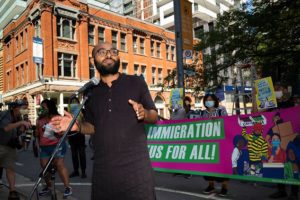Building Power with Migrant Workers in Ontario: Meet Syed Hussan
“The work of organizing as working-class, racialized migrants is very personal,” says Syed Hussan, executive director of Migrant Workers Alliance for Change (MWAC) in Ontario, a grantee partner of the WES Mariam Assefa Fund. An immigrant himself, Hussan began working as an organizer with MWAC in 2008.
“This is collective work—it is not just about my own experience,” he says.
Over the last decade-plus, Hussan has seen barriers that many migrants encounter at work, particularly in sectors such as agriculture—whether on farms or in factories–domestic work, and other low-wage industries.
As an organization of migrants, MWAC aims to improve the working and living conditions of live-in caregivers, seasonal agricultural workers, other temporary foreign workers, and international students across Canada. MWAC’s mission reflects the needs of thousands of migrant workers and students, helping them build power and providing support as the coalition presses for quality jobs and equity in the workplace.
When the COVID-19 pandemic hit, MWAC quickly advocated on behalf of migrant workers, who now faced shutdowns, health risks, and rapidly changing circumstances. On March 14, 2020, just days before Canada closed its borders, MWAC, along with groups across the country, wrote a letter to several premiers and the Prime Minister to bring attention to the coalition’s concerns about the pandemic’s likely impact on migrant workers.
Since then, and throughout the pandemic, MWAC has scaled its efforts to fight for equity, particularly to support frontline workers. The coalition nimbly mobilized to get people access to cell phones and establish data hubs and communication channels to ensure that no one was left behind. MWAC has run four hotlines and fielded countless texts and phone calls at all hours of the day. More recently, they partnered with Workers Action Centre to ensure that over 1,800 workers, most of them migrants, could get vaccinated. Its commitment to organizing its members and listening to their needs has led to membership growth and solidified MWAC’s role as a leader and advocate.
Hussan learned early on that in order to make change happen, it was critical for migrants to advocate for themselves.
“In Canada, there are not many institutions that do this sort of work,” he points out. “Leadership, advocacy, and organizing all involve a continuous process of listening to workers and understanding their individual experiences. This enables MWAC to develop priorities closely aligned with workers’ needs.”
Building the leadership capacity of migrant workers in the Greater Toronto Area is central to MWAC’s work. The coalition supports migrant worker leaders of tomorrow by engaging directly with the workers of today. MWAC has cultivated a space which ensures that migrant voices and communities of colour are uplifted and at the center of all its efforts.
Hussan offers thoughtful advice to aspiring activists, organizers, and changemakers. “Activism skills are not a one-size-fits-all. If you are interested in making change, there are always skills you can apply from your journey. Look deeply at the work your group or organization is doing and tap into the diverse skills that different people can offer.”
Stay in Touch
Thank you for your interest in the WES Mariam Assefa Fund. We’ll share updates on the Fund’s efforts, what we’re learning, and opportunities through our email list.
